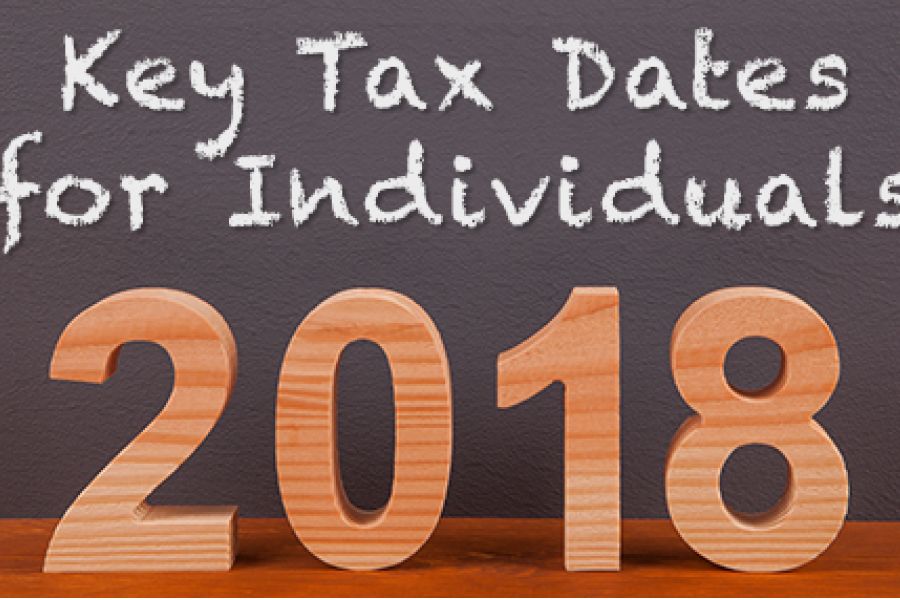You may have breathed a sigh of relief after filing your 2017 income tax return (or requesting an extension). But if your office is strewn with reams of paper consisting of years’ worth of tax returns, receipts, canceled checks and other financial records (or your computer desktop is filled with a multitude of digital tax-related files), you probably want to get rid of what you can. Follow these retention guidelines as you clean up. General rules Retain records that support items shown on your tax return at least until the statute of limitations runs out — generally three years from the due date of the return or the date you filed, whichever is later (four years for California). That means you can now potentially throw out...

While April 15 (April 17 this year) is the main tax deadline on most individual taxpayers’ minds, there are others through the rest of the year that you also need to be aware of. To help you make sure you don’t miss any important 2018 deadlines, here’s a look at when some key tax-related forms, payments and other actions are due. Keep in mind that this list isn’t all-inclusive, so there may be additional deadlines that apply to you. Please review the calendar and let me know if you have any questions about the deadlines or would like assistance in meeting them. June 15 File a 2017 individual income tax return (Form 1040) or file for a four-month extension (Form 4868), and pay any tax and interest...
The Tax Cuts and Jobs Act (TCJA) includes many changes that affect tax breaks for employee benefits. Among the changes are four negatives and one positive that will impact not only employees, but also the businesses providing the benefits. 4 BREAKS CURTAILED Beginning with the 2018 tax year, the TCJA reduces or eliminates tax breaks in the following areas: 1. Transportation benefits. The TCJA eliminates business deductions for the cost of providing qualified employee transportation fringe benefits, such as parking allowances, mass transit passes and van pooling. (These benefits are still tax-free to recipient employees.) It also disallows business deductions for the cost of providing commuting transportation to an employee (such as hiring a car service), unless the transportation is necessary for the employee’s safety. And it suspends...
When a company’s deductible expenses exceed its income, generally a net operating loss (NOL) occurs. If when filing your 2017 income tax return you found that your business had an NOL, there is an upside: tax benefits. But beware — the Tax Cuts and Jobs Act (TCJA) makes some significant changes to the tax treatment of NOLs. Pre-TCJA law Under pre-TCJA law, when a business incurs an NOL, the loss can be carried back up to two years, and then any remaining amount can be carried forward up to 20 years. The carryback can generate an immediate tax refund, boosting cash flow. The business can, however, elect instead to carry the entire loss forward. If cash flow is strong, this may be more beneficial, such as if the...
Classifying workers as independent contractors — rather than employees — can save businesses money and provide other benefits. But the IRS is on the lookout for businesses that do this improperly to avoid taxes and employee benefit obligations. To find out how the IRS will classify a particular worker, businesses can file optional IRS Form SS-8, “Determination of Worker Status for Purposes of Federal Employment Taxes and Income Tax Withholding.” However, the IRS has a history of reflexively classifying workers as employees, and filing this form may alert the IRS that your business has classification issues — and even inadvertently trigger an employment tax audit. Contractor vs. employee status A business enjoys several advantages when it classifies a worker as an independent contractor rather than as an employee....
As posted by Thomson Reuters on 4/11/18 The April 17th deadline arrived this month . . . and sometimes it happens . . . you don’t have the cash to pay the balance due on your return. You can avoid the Late Filing of Return Penalty if you file an extension (generally, six months). But the money is still due meaning that the Late Payment of Tax Penalty and Interest come into play. This Tax Planning Letter reviews methods by which financially distressed taxpayers may be able extend the payment of their income taxes including those outlined in the Table of Contents below: TABLE OF CONTENTS Paying in full within 120 days Installment agreements Offers in compromise Temporarily delaying the collection process PAYING IN FULL WITHIN 120 DAYS A taxpayer can pay the...
- 1
- 2
- 3
- 4
- 5
- 6
- 7
- 8
- 9
- 10
- 11
- 12
- 13
- 14
- 15
- 16
- 17
- 18
- 19
- 20
- 21
- 22
- 23
- 24
- 25
- 26
- 27
- 28
- 29
- 30
- 31
- 32
- 33
- 34
- 35
- 36
- 37
- 38
- 39
- 40
- 41
- 42
- 43
- 44
- 45
- 46
- 47
- 48
- 49
- 50
- 51
- 52
- 53
- 54
- 55
- 56
- 57
- 58
- 59
- 60
- 61
- 62
- 63
- 64
- 65
- 66
- 67
- 68
- 69
- 70
- 71
- 72
- 73
- 74
- 75
- 76
- 77
- 78
- 79
- 80
- 81
- 82
- 83
- 84
- 85
- 86
- 87
- 88
- 89
- 90
- 91
- 92
- 93
- 94
- 95
- 96
- 97
- 98
- 99
- 100
- 101
- 102
- 103
- 104
- 105
- 106
- 107
- 108
- 109
- 110
- 111
- 112
- 113
- 114
- 115
- 116
- 117
- 118
- 119
- 120
- 121
- 122
- 123
- 124
- 125
- 126
- 127
- 128
- 129
- 130
- 131
- 132
- 133
- 134
- 135
- 136
- 137
- 138
- 139
- 140
- 141
- 142
- 143
- 144
- 145
- 146
- 147
- 148
- 149
- 150
- 151











